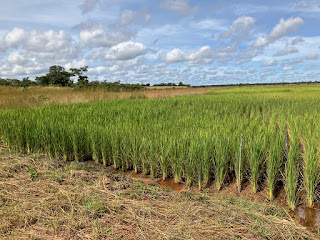In a bid to boost agricultural productivity and enhance food security, the Zambian government has called upon farmers in Kawambwa District to diversify their crops and embrace rice farming.
This
move comes as part of a collaborative effort with the Japanese International
Cooperation Agency (JICA) under the Market Oriented Rice Development Project
(MOREDEP).
Highlighting
the potential of rice as a high-value crop, Steven Musonda, the Kawambwa
District Agricultural Coordinator (DACO), emphasized that rice cultivation can
offer farmers substantial returns on their investment.
"As
the Ministry of Agriculture, we have always spoken about diversification. We
have trained farmers to diversify from mono-cropping of maize into other
high-value crops like rice," he said.
The
DACO further stated that rice provides a higher profit margin compared to other
crops. For instance, a farmer can make about K 10,000 profit per hectare as a
gross profit, which should encourage farmers to consider rice farming for
better financial returns.
Kawambwa
District, known for its fertile land, proves to be an ideal location for rice
farming. The abundant availability of water resources from nearby rivers
further bolsters the suitability of the region for cultivating this staple
crop. Recognizing this untapped potential, the Ministry of Agriculture is
spearheading efforts to promote rice farming.
JICA's
MOREDEP has been actively involved in providing technical support to local rice
farmers. Juri Sakai, a rice expert from JICA, emphasized their mission to
empower farmers with modern agricultural practices.
Through
training sessions, workshops, and demonstrations, JICA aims to equip farmers
with the necessary knowledge and skills for sustainable rice production.
"We
want to ensure that farmers have access to the latest agricultural techniques,
from planting to post-harvest handling," Sakai said.
This
support aims to increase productivity while reducing the environmental impact
of farming practices.
The
project's impact is already visible, with farmers experiencing increased yields
and improved market opportunities.
Entrepreneurs
like Scott Mantel from Kawambwa district are also seizing the opportunity.
Mantel's company aims to establish a rice value chain that connects farmers to
markets within Zambia and beyond.
"Our
vision is to not only produce high-quality rice but also ensure that farmers
receive fair compensation for their hard work," Mantel stated.
By
establishing partnerships with processors, distributors, and retailers,
Mantel's venture seeks to create a sustainable market for locally grown rice,
benefiting both farmers and consumers.
"Luapula
has some of the most fertile lands in the country, so we see a great business
opportunity for farmers to start growing rice because most of the rice comes
from Kasama or Tanzania," he said.
Mantel
further expressed his plans for this year, proposing a pilot project in
collaboration with Chief Munkanta. They aim to rent a tractor and prepare 5 or
10 hectares of land, providing an easy and low-cost entry for farmers to try
rice cultivation.
"We
want to create a market so that those participating in this pilot project will
buy all the rice and pass along as much profit as we can to farmers. We're
going to act as a middleman," Mantel added.
He
also spoke of the potential to aggregate the rice produced and sell it to local
schools and markets. In the future, he hopes to explore exporting opportunities
to countries such as the Democratic Republic of Congo (DRC) or Tanzania, where
the demand for rice is high.
The shift towards rice farming promises a positive transformation in the lives of farmers and the broader community in Kawambwa. With continued support from the Zambian government and JICA's expertise, the district is poised for a sustainable agricultural revolution that will drive economic growth and secure food supplies for years to come.

Comments
Post a Comment